Many thanks to our Patrons who cover ~2/3 of our hosting bill. Please join them if you can.
1848
Jump to navigation
Jump to search
1838 < 1839 < 1840 < 1841 < 1842 < 1843 < 1844 <1845 < 1846 < 1847 < 1848 > 1849 > 1850 > 1851 > 1852 > 1853 > 1854 > 1855 > 1856 > 1857 > 1858
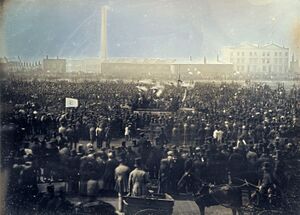 | |
| 1848 was a year of bourgeois revolutions across Europe. |
1848 is historically famous for the wave of revolutions, a series of widespread struggles for more liberal governments, which broke out from Brazil to Hungary; although most failed in their immediate aims, they significantly altered the political and philosophical landscape and had major ramifications throughout the rest of the century.
Cheering revolutionaries in Berlin, on March 19, 1848, with the new flag of Germany
French Revolution of 1848: Republican riots forced King Louis-Philippe to abdicate
German National Assembly's meeting in St. Paul's Church
Battle of Pákozd in the Hungarian Revolution of 1848
Events
- January 3 – Joseph Jenkins Roberts is sworn in, as the first president of the independent African Republic of Liberia.
- January 12 – The Palermo rising erupts in Sicily, against the Bourbon Kingdom of the Two Sicilies.
- February 2 - Mexican–American War – Treaty of Guadalupe Hidalgo: Mexico cedes virtually all of what becomes the Southwestern United States to the U.S. The unincorporated California Territory becomes a provisional official possession; it is never organized by the United States Congress as a territory, but directly passes the requirements for statehood in 1850.
- February 21 – Karl Marx and Friedrich Engels publish The Communist Manifesto (Manifest der Kommunistischen Partei) in London.
- February 24 – Louis Philippe I, King of the French, abdicates in favour of his grandson, Prince Philippe, Count of Paris, and flees to England after days of revolution in Paris. The French Second Republic is later proclaimed by Alphonse de Lamartine, in the name of the provisional government elected by the Chamber, under the pressure of the mob.
- March 2 – The March Unrest breaks out in Sweden.
- March 11 – Louis-Hippolyte Lafontaine and Robert Baldwin became the first Joint Premiers of the Province of Canada to be democratically elected, under a system of responsible government.
- March 13 – Prince Klemens von Metternich gives up office as State Chancellor and Foreign Minister of the Austrian Empire.
- March 15 – Hungarian Revolution of 1848: The Hungarian young revolutionary intellectuals, led by Sándor Petőfi, Mór Jókai, etc., called the Márciusi Ifjak (Young men of March) organize peaceful mass demonstrations in Pest, forcing the city's Habsburg authorities to accept the 12 Points: the Hungarian claim for freedom and self-determination within the Habsburg Empire. On the same day, Lajos Kossuth and representatives of the Diet of Hungary go to Vienna, and force the emperor and Hungarian king Ferdinand I of Austria to accept Hungarian claims for self-determination within the empire.
- March 18 - In a Berlin barricade, fighting between revolutionaries and royalist forces marks the culmination of the German revolutions of 1848–49. Hundreds are killed in the clashes, but King Frederick William IV of Prussia is forced to honour the dead, and appoint a liberal government.
- April 10 - A Chartist 'Monster Rally' is held in Kennington Park London, headed by Feargus O'Connor. A petition demanding the franchise is presented to the Parliament of the United Kingdom.
- April 11 – The first Hungarian national government is formed, under the leadership of Lajos Batthyány. The April Laws, the first democratic revolutionary laws in Hungary, are promulgated. These laws are the first modern laws in Hungary, which put an end to the feodal privileges of the nobility and serfdom, proclaim the freedom of religion, the freedom of the press, the foundation of the Hungarian National Bank, organises the first democratic election in Hungary based in popular representation, national guard, reunion of Transylvania with Hungary, etc. The Habsburg emperor, and Hungarian king Ferdinand I of Austria, ratify these laws, which form the base of modern Hungary.
- April 18 – The Second Anglo-Sikh War breaks out in the Punjab.
- April 27 – The second abolition of slavery in France and its colonies initiated by Victor Schœlcher.
- May 18 – The first German National Assembly (Nationalversammlung) opens in Frankfurt, Germany.
- June – The Serbians from Vojvodina start a rebellion against the Hungarian government.
- June 2 – 12 – The Prague Slavic Congress brings together members of the Pan-Slavism movement.
- June 17 – The Austrian army bombards Prague, and crushes a working-class revolt.
- July – The Public Health Act establishes Boards of Health across England and Wales, the nation's first public health law, giving cities broad authority to build modern sanitary systems.
- July 29 – Young Irelander Rebellion: A nationalist revolt in County Tipperary, against British rule, is put down by the Irish Constabulary.
- August 14 – American President James K. Polk annexes the Oregon Country, and renames it the Oregon Territory as part of the United States.
- August 17 – The Independent Republic of Yucatán officially unites with Mexico, in exchange for Mexican help in suppressing a revolt by the indigenous Maya population.
- August 19 – California Gold Rush: The New York Herald breaks the news to the East Coast of the United States that there is a gold rush in California (although the rush started in January).
- September 11 – The Croatian army of Josip Jelačić, encouraged in secret by the Habsburg government, crosses the Drava River and attacks Hungary, with the goal of ending the revolution in that country.
- September 12 – One of the successes of the Revolutions of 1848, the Swiss Federal Constitution, patterned on the US Constitution, enters into force, creating a federal republic, and one of the first modern democratic states in Europe.
- September 25 – The Hungarian king and Habsburg emperor Ferdinand V refuses to recognise the Hungarian government, led by Lajos Batthyány. The Batthyány government resigns and the National Defence Committee is formed, which is a temporary crisis government, totally independent from Vienna, under the leadership of Lajos Kossuth.
- October 2 – The National Defence Committee (Országos Honvédelmi Bizottmány), led by Lajos Kossuth, becomes the executive power in Hungary, after the resignation of the Lajos Batthyány government.
- October 3 – General Anton Puchner, commander of the Austrian armies of Transylvania, declares insurrection against Hungary, and, together with the Romanian insurgents led by Avram Iancu, attacks and chases away the Hungarian armed forces occupying Transylvania. During these events (mostly in October 1848 – January 1849, but also between May–July 1849) between 7,500 and 8,500 Hungarian civilians (men, women, and children) are massacred by the Romanian insurgents.[1]
- October 28 – In Catalonia, Spain, the Barcelona–Mataró railroad route (the first to be constructed in the Iberian Peninsula) is inaugurated.
- October 30 – Battle of Schwechat: Hungarian forces which crossed the Austrian border, in order to unite with the Viennese revolutionaries, are defeated by the imperial army, led by Alfred I, Prince of Windisch-Grätz and Josip Jelačić.
- October 31 – Vienna is occupied by the imperial forces led by Alfred I, Prince of Windisch-Grätz, who crushes the revolution here.
- November 3 – A new Constitution of the Netherlands (drafted by Johan Rudolph Thorbecke), severely limiting the power of the monarchy and introducing representative democracy, is proclaimed.
- November 4 – France ratifies a new constitution. The French Second Republic is set up, ending the state of temporary government lasting since the Revolution of 1848.
- November 7 – 1848 United States presidential election: Whig Zachary Taylor of Louisiana defeats Democrat Lewis Cass of Michigan, in the first U.S. presidential election held in every state on the same day.
- November 24 – Pope Pius IX flees Rome in disguise for Naples.
- December 2 – Emperor Ferdinand I of Austria abdicates in favor of his nephew, Franz Joseph, who will serve as Emperor of Austria and King of Hungary and Bohemia, until his death in 1916.
- December 6 – The Austrian imperial army, led by Franz Schlik, attacks Hungary.
- December 10 – Prince Louis-Napoléon Bonaparte is elected first president of the French Second Republic.
- December 16 – The main Austrian imperial forces, led by Alfred I, Prince of Windisch-Grätz, cross the Hungarian border.
- December 20 - President Napoleon III takes his oath of office in front of the French National Assembly.
Ongoing events
- Great Famine (Ireland) (1845–49).
Events
| Event | Start | End |
|---|---|---|
| Pax Brittanica | 1815 | 1915 |
| Victorian era | 1840 | 1901 |
New Groups
| Group | Image | Type | Description |
|---|---|---|---|
| BNP Paribas | 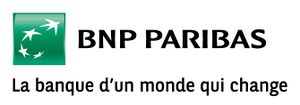 | World's 8th largest bank by total assets, paid the US Justice Department $8.97 billion after accusations of money laundering | |
| University of Mississippi | 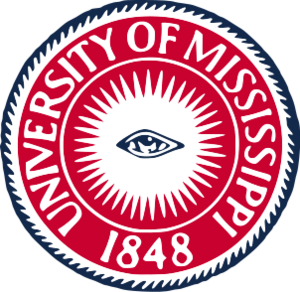 | PublicFlagshipSea-grantSpace-grant | The largest university in the state by enrollment |
| University of Ottawa | 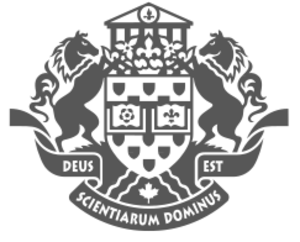 | University | Bilingual university in Ottawa, Ontario, Canada. |
| Queen's College London |  | Prestigious English girls school. | |
| Muhlenberg College | 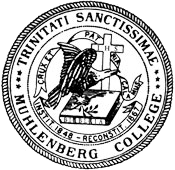 | ||
| Lazard Ltd | 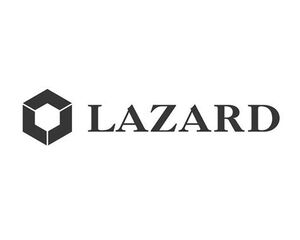 | Big money sponsor of the WEF/Young Global Leaders | |
| Denmark/Ministry of Justice |  | ||
| Phi Delta Theta | 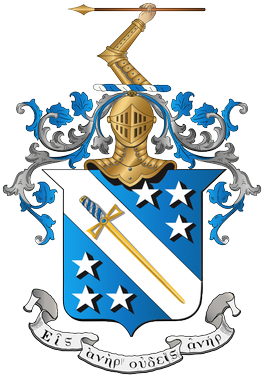 | Fraternity | US fraternity |
A Death
| Title | Born | Died | Summary | Description |
|---|---|---|---|---|
| John Jacob Astor | 17 July 1763 | 29 March 1848 | Businessperson Millionaire Drug trafficker | The first multi-millionaire in the US, who "seemed to be backed by “friendly forces” and in the right places |
Births
| Title | Born | Place of birth | Died | Summary | Description |
|---|---|---|---|---|---|
| E. H. Harriman | 20 February 1848 | New York US Hempstead | 9 September 1909 | Businessperson | |
| William Waldorf Astor | 31 March 1848 | New York | 18 October 1919 | Politician Lawyer Businessperson Publisher | Member of the Astor family |
| Arthur Balfour | 25 July 1848 | Scotland Whittingehame House East Lothian | 19 March 1930 | Politician | UK PM 1902-1905, Milner Group Society of the Elect |
Many thanks to our Patrons who cover ~2/3 of our hosting bill. Please join them if you can.
References
- ↑ Egyed Ákos: Erdély 1848–1849 (Transylvania in 1848–1849). Pallas Akadémia Könyvkiadó, Csíkszereda 2010. p. 517 (Hungarian)



